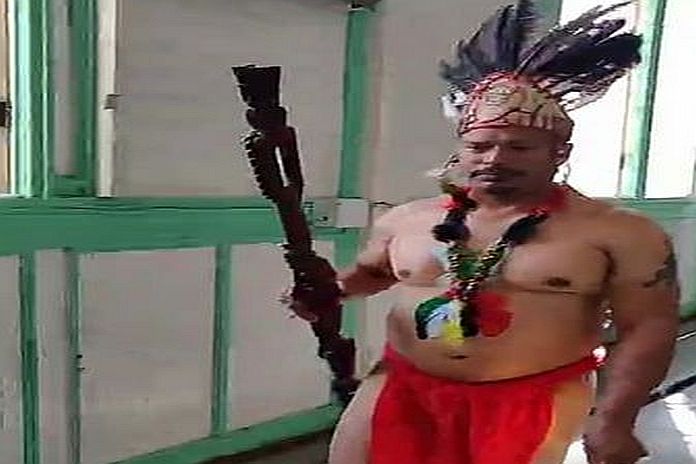By Ray Chickrie
GEORGETOWN, Guyana – There was a turning point in the history of Guyana when Indigenous leader, Chief Lenox Shuman, was barred from entering Guyana’s High Court to listen to a contentious case relating to Guyana’s national election which has ended up in court due to allegations of rigging by the opposition.
Indigenous leader Shuman arrived wearing his indigenous Chieftaincy wear but was prevented from entering because he was not “sufficiently and decently clothed” – a violation of Guyana’s laws.
Again, as the high profile case was about to commence, Shuman walked into the Court corridors wearing his chieftain attire, and hysteria broke out. There was a loud laugher and yelling. At the Court, onlookers could be heard saying, “Oh my god look what he is wearing, what is this.”
Guyanese on social media vented their anger on the issue, stating:
“In the name of Jesus l release spiritual bones in the air to dismantle the forces of wickedness that’s hovering in the atmosphere Gabriel and your team take charge and clear the air in Jesus Mighty name,” writes one blogger.
“Every culture should be respected, and more so if you are in their country ….RESPECT DUE TO ALL FIRST NATION PEOPLE…..” Candy Singh.
“Look at this attention seeker, he has no respect for the court. Now imagine this man was the president showing up at the UN dressed like this. There is a time and place for everything Sir.” Jermaine Figueiro added, he “must respect the law.”
“Sanjiv Sawh wrote, “It’s funny how the people who are mocking Shuman’s traditions are the ones who have had their names, religion and clothing beaten into them by slave masters.”
However, the Indian chief is getting a lot of support from Guyanese and there are calls that the laws must be amended to address this bias.
Shuman is the leader of a small party, the Liberty and Justice Party, and contested Guyana’s recent general election which took place on March 2. The final results of the election have been held up at the Guyana High Court due to an injunction by the opposition of alleged rigging by the ruling government of president David Granger.
According to Shuman’s party webpage, “He descends from a long line of chiefs of the Arawak (clan) of St Cuthbert’s Mission that predates the formation of Guyana. Known as the Jaguar People, the Arawak have been known to occupy the coastal regions of South America and the Caribbean Islands and have their roots in the Indigenous identity of Guyana dating back over 30,000 years.”
In 2015 he attained the rank of Chief of his community. “As Chief and leader of my community, I have always challenged the status quo. I believe that successive governments have made it very clear that they do not want to see or encourage strong indigenous leaders. They like them malleable and politically aligned. I am neither,” his party webpage reads.
Upon migrating to Canada, Shuman graduated High School in Toronto at Jarvis Collegiate Institute. After high school, he graduated with a Diploma in Business and a Commercial Pilot Licence. In 2009 Shuman returned to Guyana.
In 2015, he was elected as vice-chairman of the National Toshaos Council, an umbrella group representing Guyana’s native people, and served for three years “advocating for respect for the rights of indigenous peoples and promoting better governance in indigenous communities.”
Meanwhile, Guyana is yet to change many “civilizing” colonel laws that colonists imposed as their norms of “decency,” and “respectability.” The colonial masters saw nakedness, and other forms of local dress as “primitive, weird, backward and evil.”
Shuman told the media, “I came in my traditional wear because it is my constitutional right to do that. “People don’t stop people when they walk in with a dhoti; they don’t stop you when you walk in with traditional African or Chinese attire. But yet, here we have an Indigenous person dressed traditionally and I am being stopped.”
He added, “I am the only Indengenious person that has a stake in this, and I am being stopped, and my voice is being stopped by the authorities ignorant of the laws they have to enforce.”
“Why would I be arrested?”, he asked. “We are marginalized and thrown into trenches. Why should we not have a stake in what is going on?” he asked the media.
Eventually, Amerindian Chief Shuman was allowed to enter the classroom after a long spectacle with authorities.





